
Interview and transcription
Ken Dawe : Well, it all started back in my father and his brother’s time – probably ‘30s I guess. They decided they would get themselves a 9.5 moving camera and a projector and all that stuff, and they used to take farming activities, weddings, even stuff that went on down the village, and there was reels and reels and reels of it, and then I started doing a bit, but the camera wasn’t very good come the end, so that obviously stopped. But my late cousin Douglas, he came out when we were at the farmhouse – Rhoda’s house – on one or two occasions and said he would like to get this put onto something a bit better, because the films were getting brittle and they kept breaking, so we experimented a bit, but in the end he took it somewhere and got it put on a video tape to start with. The rest of the films – because I’ve still got some – they’re not in a container, they are in our shed, actually, and the projector. Some of it went down to what was then ITV archives down at Plymouth, so it’s down there gathering dust somewhere, I reckon. But yes, they took a lot of film of the farm.
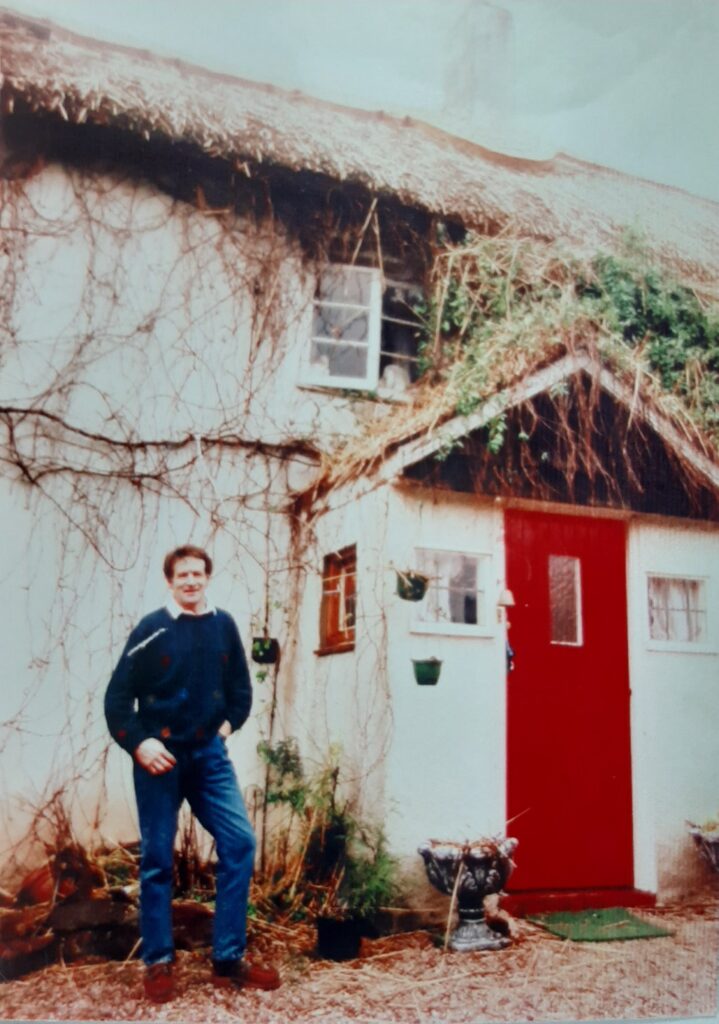
Ken Dawe outside Ashill Farmhouse
Yvonne: Have you got any of it?
Ken Dawe: We’ve got it made into a video and then it was transferred on to a DVD. I’ve got that.
Yvonne: Could we borrow that?
Ken Dawe: Yes, of course you can, but I think there’s a lot of people in the village actually got it, but that’s neither here nor there. Now the other thing I’ve got, which again a lot of people in the village have probably got – it was the Millennium. They did a lot of different things, obviously, in the village and they came up to Rhoda’s house because we were living there then, and we had the next door as well, and they did little sketches of different things – Olde Worlde.
Yvonne: Yes, we’ve got that. We got that from Maggie Sullivan.
Ken Dawe: Yes, I’ve got that as well.
Yvonne: Yes, that’s already on the website
Ken Dawe: Well that’s it, but the other – you are quite willing, if I can dig it out
Yvonne: Well Sheila remembers it. She might have a copy herself.
Ken Dawe: Quite a few people
Yvonne: Was there one of Clifford’s little grandsons on? Clifford Wallis?
Ken Dawe: Oh, the one who was killed in the war?
Yvonne: Yes, well the father – his grandson Noel, is it? When he was a child?
Ken Dawe: No, that was, I think, his eldest son’s boy. He had two, a girl as well. They went up to Tunbridge Wells because Uncle Francie was a chauffeur to one of the big houses in the village – I don’t know which one – and when these people moved up to Kent, Uncle Francie went with them so they made their life up there after that.
Yvonne: One of Noel’s children has been in to see us
Ken Dawe: Yes, well Noel had a sister Joy who is obviously my cousin. Joy was down for Nicky Hill’s daughter’s wedding back in the summer. Noel died many years ago.
Yvonne: I can’t remember their names, but they talked about Joy. They just came in on the off chance and it turned out they were Wallis family.
Ken Dawe: Nicky’s mother – she had a sister which Uncle Francie married. Does that sound the right age gap? Nicky’s mother Eirwin married Derek and her sister Gwen – Gwendolyn – that was Uncle Francie’s wife, and they have obviously had children which are all up the other end of the country.
Yvonne: Because she’s a Quantick isn’t she?
Ken Dawe: Yes, a Quantick, that is correct.
Yvonne: So, Gwen is a Quantick?
Ken Dawe: Yes
Yvonne: Oh, that makes sense. So, what relation …… a member of your family married into the Wallises as well?
Ken Dawe: Yes, because my grandfather Wallis was the Headmaster. He came down to the village school after the lady – well, sort of Headmistress – she was running it while they were looking for a proper Headmaster. Clifford Wallis came down from the Bristol area, I think.
Yvonne: I think he was born in Weymouth.
Ken Dawe: Was it Weymouth? Cousin Peter knows all that side because it’s not really my side of the family.
Yvonne: So, which of your relatives married into the Wallises?
Ken Dawe: Well, they had nine children – one, Clifford, was killed in the First World War, or towards the end of that – and my mother… It’s all a bit complicated because my mother married, obviously, my father – married into the Dawe family in 1940 – so you know, I’m just cousins. I’m not the main Wallis family.
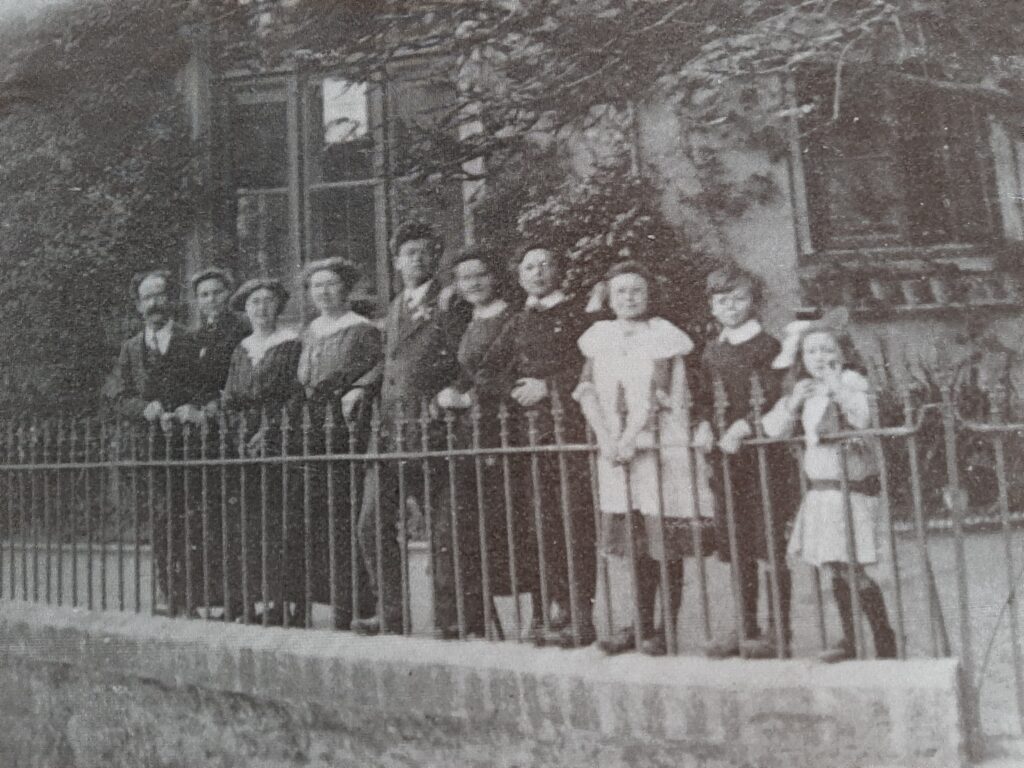
Clifford Wallis and his family outside of Bishopsteignton School c 1914
Yvonne: No, but what was your mother’s name then?
Ken Dawe: Joan
Yvonne: Joan Wallis?
Ken Dawe: Yes. See, there was in age – I think there was Clifford (the one who was shot in the War), there was Uncle Francie, Uncle Ken. I don’t know if I’ve got them in the right age order. There was my Aunty Mary, Aunty Gladys, Aunty Fanny, Aunty Christine, and my mother was the youngest, so there was quite a lot of them, and obviously Grandfather Wallis carried on being Headmaster until he retired.
Yvonne: So, what do you remember about that school? Did you go to that school?
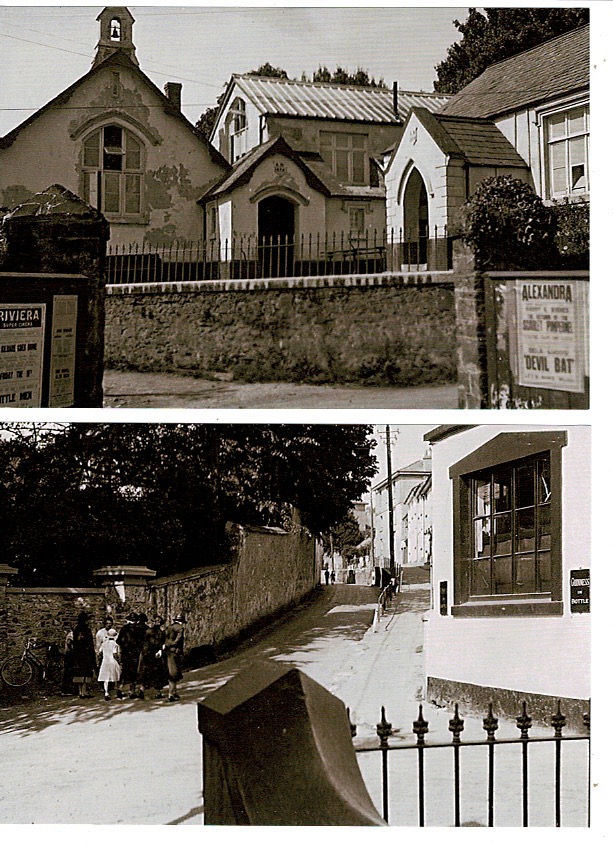
Bishopsteignton Primary School from the gates of Shute Farm, and a view of Fore St. From Cross Gate
Ken Dawe: Yes, I went to that school, obviously, at the usual age – five, I guess – but I will tell you something. Dinners were brought in containers in those days. There was no school canteen and I had two dinners. I didn’t have any more after that. I ran home after that, so I commuted from school to over the road there every day thereafter.
Yvonne: Why was that then?
Ken Dawe: Didn’t like ‘em. The food coming in boxes! I don’t know where it was done, but then of course later on – not that I ever went there at all – but just before I left school and went to Grammar they built the canteen up there, didn’t they, in what is now the old scout hut and they had dinners up there, cooked on site, and again my cousin Peter’s mother – my Uncle Ken’s wife – and another lady called Honeywell. What was her name? Lived along Wallis Grove. Can’t remember her Christian name. They were the head cooks up there.
Yvonne: Not Granny Honeywell?
Ken Dawe: No
Yvonne: Younger than that?
Ken Dawe: Yes
Yvonne: So what year were you born?
Ken Dawe: 42
Yvonne: So, you are a bit young to remember any of the evacuee children.
Ken Dawe: The only thing I did subsequently remember or knew was my Granny and Grandfather Dawe, Granny Dawe had relatives in Guernsey and when it looked likely that the Germans were going to overrun it, the family – and I think they were like cousins of Granny Dawe’s so they weren’t immediate but they were cousins – they came across and spent the war years in the farmhouse. Now there were two brothers – Michael and Derek. The father – Bill – he had to stay behind in Guernsey to look after I’m not sure if it was his father or father-in-law because he was old and he wasn’t going to move. Because Bill, the father, was an engineer, when the Germans overran it he was carted off to a civilian prisoner of war camp in the middle of Germany somewhere, and the things he used to tell me about that was unbelievable.
So, they came over – the family. Lived in the farmhouse. All over the floors they were sleeping. Derek was the eldest and he was, apparently, because I didn’t know him (I’ve known him since but not then), Derek was the older and he was a bit more together but Michael was a right sod apparently and the dairy for the farm which we developed in those days and they had a big boiler to get steam up for steam cleaning and hot water for washing all the equipment, and my Uncle Ern, which was one of my Dad’s brothers, was very protective about his chopping axe because it was sharp as a razor because it was a wood-fired boiler and apparently Michael said “I can chop the wood for you, Uncle Ern”, he said, and of course he kept missing and letting it go into the ground and he wasn’t well liked for that.
But then of course, when the war was over and this particular prisoner of war camp was released – by the Americans I think, because it was a civilian prisoner of war – anybody that the Germans felt, like engineers, might do them some sort of harm were put in places like that, and he was obviously eventually relieved and released and came back to England, but of course, being an engineer he wasn’t going to go back to Guernsey. I don’t know whether the old man had died or what, but he went up north, up to Manchester to look for engineering work and when he found a position in one of the big factories up there that produced crank shafts – little ones for fridge motors up to things 30 metres long for big liners – he took me around there once. But once he had established up there, then the family went up there to live. Derek eventually went to Canada and Michael is now in Wales at Merthyr Tydfil. We were quite friendly with Michael but he got so obnoxious come the end that we don’t really have anything to do with him now.
Yvonne: So, what do you remember about your childhood here, then?
Ken Dawe: Well, most of it was up here, of course and I’ve got quite a bit, I can talk to you about that later if you’re interested but obviously, I didn’t go down the village a lot. We passed through it, of course. Dad was a bell ringer and I subsequently was as well. In fact, there was Dad and me and my Uncle Ken and my cousin Peter, we made up three quarters of the team. Jack Dyer – have you heard of Jack Dyer being mentioned?
Yvonne: I’ve seen the name.
Ken Dawe: He used to have pigs down at Flow Point. He used to ring No. 5 and Bob Sampson – have you heard of Bob Sampson? He was a farmer up Luton way or Ideford way, and he used to ring the Tenor, Uncle Ken rang 4th, Peter rang 3rd, I was 2nd and Dad was Captain and we used to go around to all the competitions in the Kenn Deanery. I think there’s still one or two hanging up down there with our names on them. I quite enjoyed that, to be fair, but when Dad had his stroke in early 70s, of course I had to spend more time on the farm so all that went by the board.
Yvonne: Well, Radway was like a separate village then, wasn’t it?
Ken Dawe: Well it was sort of because some of the notes I have written in here… In my younger day, the housing estates were non-existent.
Yvonne: Manor Farm was down the road, wasn’t it?
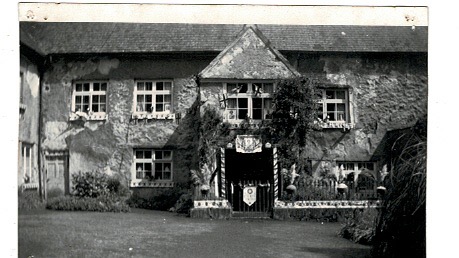
Manor Farm House on Coronation Day, 2nd Prize
Ken Dawe: Yes, Manor Farm – that was part of our place. The old big house was knocked down, you know that, at the instruction of our family, but it wasn’t listed. There was a mix-up with the listing – well it wasn’t Teignbridge then. What it would it be – Newton Abbot District Council or something, and they wanted to develop a few fields at the back and the place was knocked down. I’ve shown you photos of that, haven’t I? I expect you’ve got them as well.
Yvonne: I’ve got some photos of it being knocked down, yes.
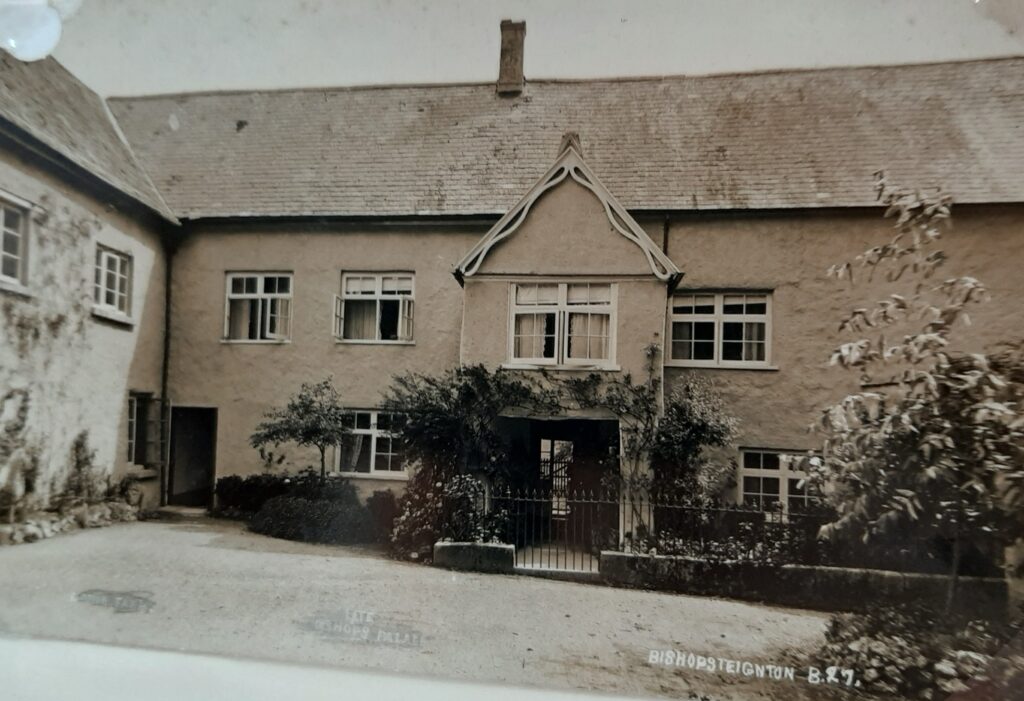
Manor Farm
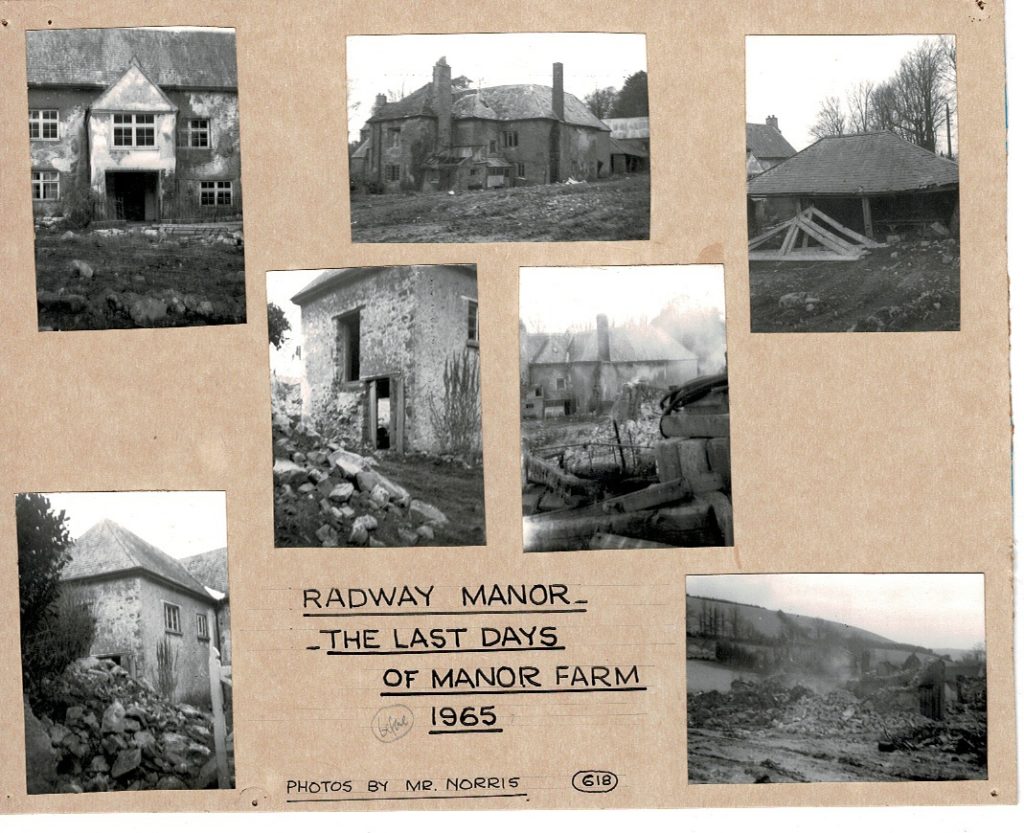
Destruction of Radway Manor to make way for Grandison Avenue Bishopsteignton, 1965
Ken Dawe: I always felt a bit guilty at that but of course I was only like this high – well, at school of course. That’s the way you went into the front
Yvonne: Yes, it’s Grandison – not Grandison, Bronscombe
Ken Dawe: I don’t know which … 77 years and I still can’t work out which …
Yvonne: I think it’s Grandison
Ken Dawe: Which of the two names is our end or the other end, so that was a real shame, that was because that would have been a super house to have restored
Yvonne: Oh yes, it was stunning, wasn’t it?
Ken Dawe: But it’s gone
Yvonne: Well, same as Tapley and Murley, you know. They’ve all gone haven’t they. So, who were you at school with then? What characters were you at school with that are still around?
Ken Dawe: Oh crikey – which school, the Junior School? Now you’ve said that I can’t remember but it will come to me. Oh, the village ones of my age? Dennis Back and ….. what the hell was he called from up …? … oh, hundreds of them, because it was quite a big school and a lot used to ….
Yvonne: Were you in the band or anything?
Ken Dawe: No, you’re going back …
Yvonne: That’s earlier isn’t it.
Ken Dawe: Yes, that’s in my Mum’s day when she was a youngster. They had the band, didn’t they, and did all sorts of things in that regard. No, it was more … We didn’t do stuff like that at school, to be honest, but a lot of children came out from Teignmouth to go to Bishop School. It was a sought-after school, because you’ve heard of Miss Robinson, the Head? She was strict and she wasn’t averse to clipping you round the ear or smacking you with her leather belt but she had good results and the Teignmouth children – mothers who wanted to get their kids in – they had a heck of a job, because it was full.
Yvonne: It wasn’t very big, was it.
Ken Dawe: No, and then of course they used the canteen for lessons during the day
Yvonne: That’s up the top, where the scout hut was?
Ken Dawe: Well, is. They haven’t knocked it down yet have they?
Yvonne: They haven’t knocked it down but they don’t use it any more do they.
Ken Dawe: No, but that was it. It served as dinner and classroom. You had to walk up and down the road. When you think back, lots of village people. Most of them have disappeared one way or another, these days. There’s one or two in the village that I see. Some of them I know who they are but I can’t put a name to it. That’s what happens when you get old. You can’t remember who’s who.
Yvonne: I know there’s a Dawe on the Home Guard photograph we’ve got. Is it Percy?
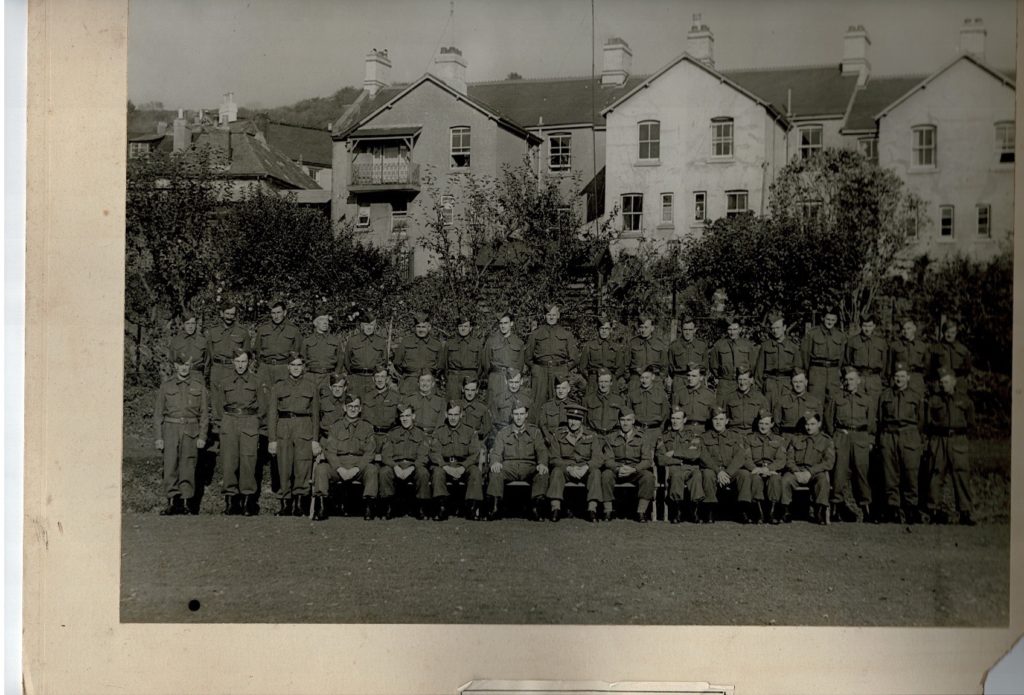
Bishopsteignton Homeguard 1942
Ken Dawe: Percy. Well, could well have been. My dad was a sergeant in the Home Guard. I think Uncle Perce was more inclined to be in the Teignmouth Home Guard because he always used to say they used to go out on the cliffs shooting seagulls for target practice, but there’s a couple of things about the Bishop Home Guard that I found out. One was, one of the platoon turned up for the – whatever they did – and he’d only got one gaiter on. Have you heard this story?
Yvonne: Yes, I have. Sheila told me this story.
Ken Dawe: Yes, one gaiter on and he was told “where was the other one” and he didn’t know so they all went out searching for this gaiter and come back and “No, it’s not there, it’s gone” and when he pulled his trouser up it was inside. And the other thing, and probably Sheila’s told me this in the past, when the invasion was supposed to be imminent my father had to go down to the Cockhaven Manor because they must have had an ammunition store down there or something and they had to prime all the hand grenades ready but there was this armoured car trundling up from Huntly way and the Home Guard didn’t know what to do to try and stop it so they threw their bicycles at it. I don’t know if you have heard that. But of course, it wasn’t, it was a ….. they probably got a telling-off for that. That’s about all I know about the Home Guard because I was only …
Yvonne: It was a very big Home Guard and I imagine that’s because there were a lot of farmers so they stayed on the land.
Ken Dawe: Yes, they probably had pitchforks and stuff
Yvonne: We found a photograph today that is intriguing. It was Mr. Sharland – I imagine it was Gunner, the original one – and a Mr. Honeywill with some German prisoners of war on one of the farms.
Ken Dawe: Oh right. Well, yes
Yvonne: It was ‘45
Ken Dawe: We had a German (ex) prisoner of war here working when I was on the farm back in the early ‘60s. He came from Guernsey, because the poor soldiers over there were starving. The German soldiers had nothing to eat and when we took it back, they were all prisoners of war. Well, Max Friedrich. Have you heard of him?
Yvonne: Oh, yes! Yes, I’m in touch with his daughter.
Ken Dawe: Yes, that’s right, and his wife was one of my mother’s Brownies or Guides because my mother used to run the Brownies I think it was, or Guides – one of the two and Monica (I think she was called Monica) was that. Now they came here because Max applied for a Herdsman’s job and it wasn’t until my father had given him the job that Mother realised that his wife was one of the Guides that she did. Max was with us then until he retired. He came from up Crediton way. That’s where he was on farms up there. [1]
Yvonne: Yes, I think I put something on Facebook about the Friedrichs and a lot of people were very complimentary about them – they said they were a lovely family.
Ken Dawe: He was alright. In the early days he took a bit of understanding because of his German accent but Max was alright. A lot of people couldn’t get on with him but – because I was working with him a lot of the time – I found him alright. Of course, he had the two kids, Karl and Jennifer
Yvonne: That’s right. It’s Jennifer that’s been in touch with me. I don’t think she’s in England anymore. I can’t remember – maybe I got her mixed up with someone else. She has been in touch on Facebook.
Ken Dawe: But Karl – I met him. He came up the vineyard, you know quite a few years ago now and I had a little chat to him and that was that really. I haven’t seen him since.
Yvonne: So, you’ve been working on the farm since you were a nipper really?
Ken Dawe: I obviously went to Junior School, Grammar, I left at the end of the 5th Form, I did my School Certificate as it was in those days, got a few – not a lot, didn’t want to go on into the 6th, left and within three months I was up Bicton Agricultural College for nine months. That was 59 / 60. Came back July ’60 and I worked on the farm must have been 35 years until I had a falling out with my cousin Roger. You’ve heard of him, I dare say, and that’s when we pulled out and started up over here..
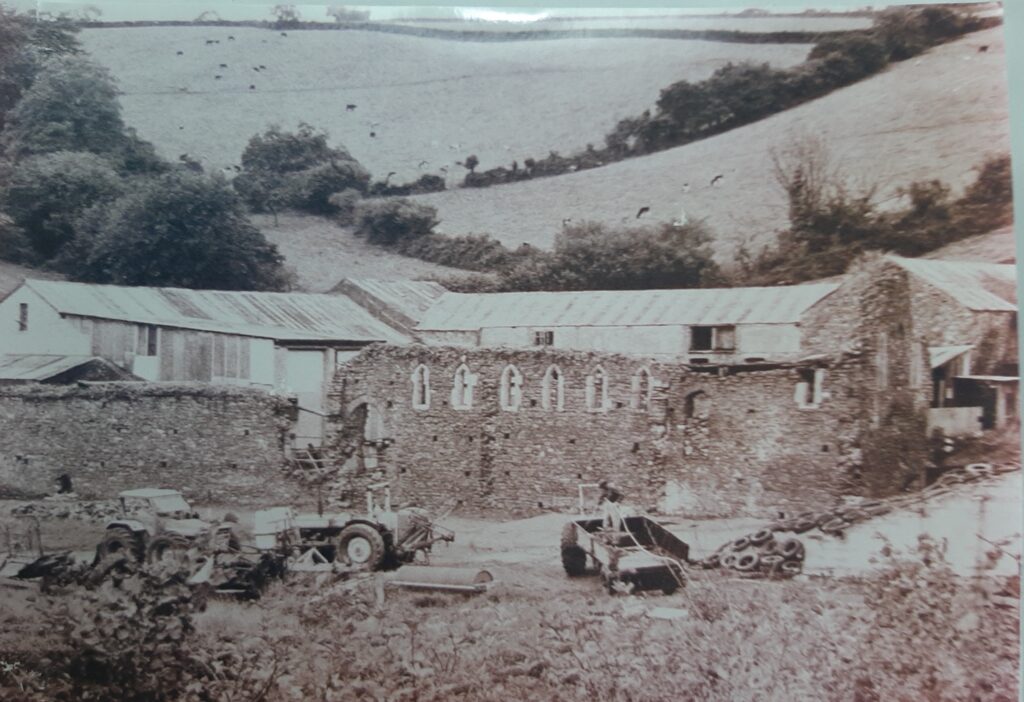
Dawe farm 1987
Well, not to start with. I had six acres of land, because I had horses at the time and we did that from Rhoda’s house, because that’s where we were. That was part of our settlement – six acres, the buildings which we eventually converted, the farmhouse and cash adjustment. So, we left the farm and did that, and then after a couple of years we got permission to develop the redundant farm buildings and my son – or Lesley’s son, my step-son Paul, we did that with others. We didn’t develop it all ourselves, because Paul was a skilled roofer and the like, but you know I was a farmer, I was a glorified labourer, if you like, but I was in charge of it all. Did all the ordering and the buying and this, that and the other, but we did get other people in – carpenters and bricklayers and all this stuff and we did that for the best part of getting on for three years.
The last one we did, which is Whidbourne Court, that was Paul and I. I’ve got a whole book of photos of that. We did that like an oak – well, it wasn’t oak; I wanted oak but it was too expensive – Douglas fir timber frame and it took us nine or ten months to do that from scratch. Well, the walls were standing but we did everything else, and Paul and I did most of that. We spent hours doing jointing. It’s all done in the medieval way, as is the bathroom extension that we put on where Rhoda is. Again, that’s all done with all these fancy joints. We just enjoyed doing it. And then we had some duff advice from the bank, to be fair, and we sold the farmhouse – not to Rhoda – there were two people in between.
Voice: Dykes – you sold it to the Dykes
Ken Dawe: The Dykes and there was somebody else
Voice: It was Catherine Hanson, wasn’t it?
Ken Dawe: Yes, and then you. So we moved out of there into Whidbourne Court but it was the connecting link – the 30 foot – we called it The Gallery, which we lived in whilst we finished the house up and then we lived there until the people that are there now, Mr. and Mrs. Hancock, who we had already sold one property to and they kept badgering me that they would like to live there.
Now, we were still trying to get planning permission for a dwelling on the vineyard site and I still felt sure that we would get it, so we sold it to them, only to find that Teignbridge wouldn’t play ball with us at all, so that’s when we moved up over the winery – illegally to start with – eventually got a three year temporary living which they eventually turned into permanent dwelling and that was fine until the present owners who we brought in as partners gradually took more and more of the shares and put more and more money in, and they refurbed underneath and then the following year they put this up here.
We moved up here and they developed the function room up the top so I have been here and that’s why we never really went down the village a lot. I think I might have gone down a few times because they used to run a youth club at some point in the village hall but I didn’t really get too involved in that to be fair. The Cubs and the Scouts I was involved in, like you do. Have you heard reference to Scouty Pawlett?. He came to the village during the war because he was a gunner. He was down on an Ack Ack gun down Coles Barn way somewhere. He might have been married at one time – I can’t remember – but he was single for all the time I knew him. He ended up on a – well, I call it a mobile home but it wasn’t – it was a glorified caravan up on Edward Perkins’ farm, Park Farm. For years he lived up there. In fact, I think they carried him out in his box – I’m not sure. He was alright. Of course, Sheila ran the Cubs and – Scouty Pawlett we called him; I’ve been trying to think of his Christian name – perhaps we never knew it.
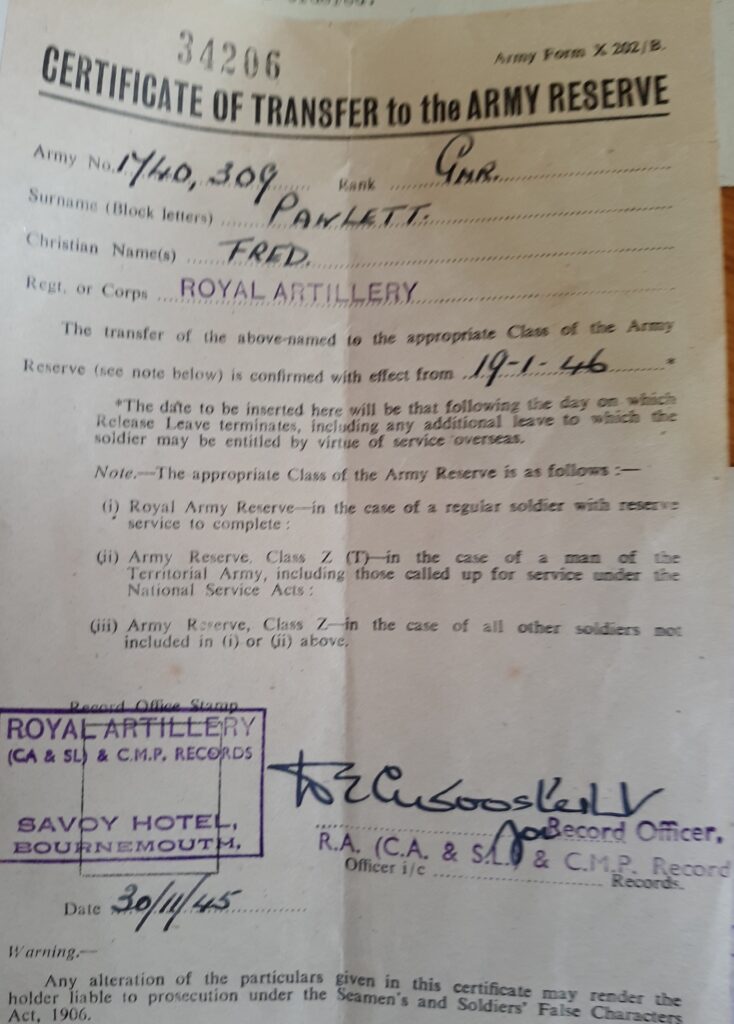
‘Scouty’ Pawlett military papers
Yvonne: No, everybody calls him Scouty, don’t they?
Ken Dawe: And he ran the Scouts and we did the normal things that you do – badge work, tracking, a bit of camping. With the Scouts we went down to Newton Ferrers and places like that, you know.
Yvonne: So, was David Quantick in the Scouts, because I’ve got so many photographs of David with Scouts and Scout Camps and stuff like that.
Ken Dawe: Well, he probably was. I can’t remember.
Yvonne: You could tell him because he’s got such blonde hair when he was younger
Ken Dawe: Well he lived – and his mum and dad and his sister – down Coombe Way. That row of bungalows, in the very bottom one, I think it was, because Grandfather put up all those and he kept two for “farm staff” but they were family staff you know. Mum and Dad were in the second one up from the far end, and that’s where I was born, and Uncle Ern, which was Dad’s next eldest was up this end, (Hack Lake) I think it’s called.
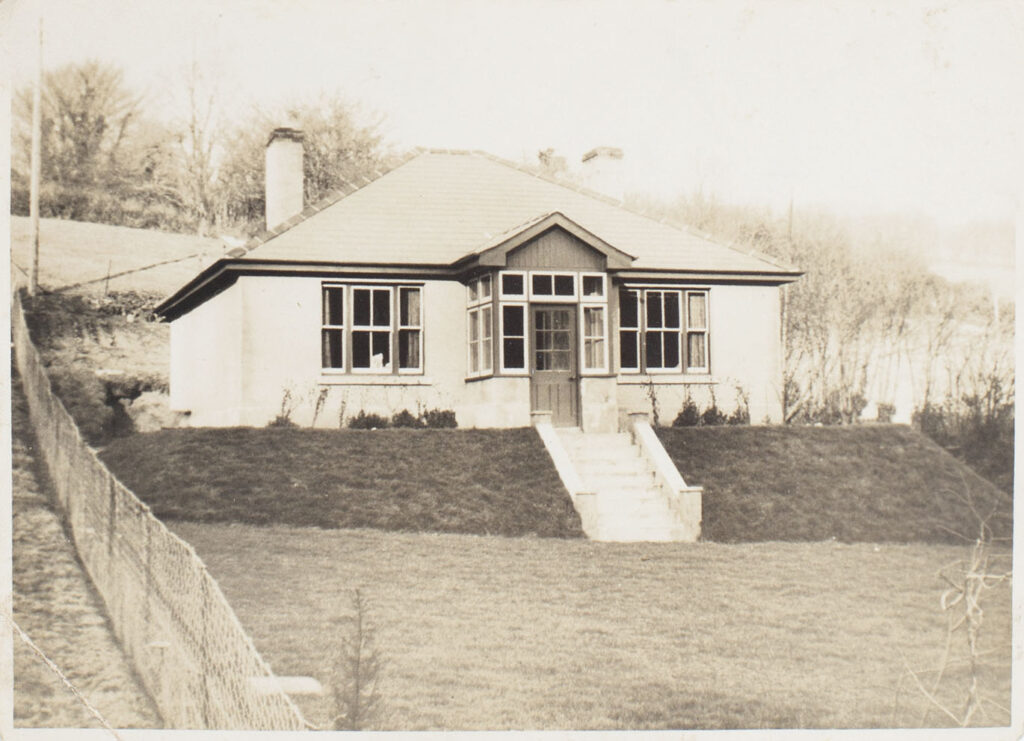
Hecklake, Coombeway, Bishopsteignton
My Grandfather Dawe had a brother and he had a small farm bottom end of Dartmoor, not too far away, I think, from where Grandfather’s was at Sampford Spiney. I’ve taken Rhoda down there. He had, what was it, a 30 acre farm I think, with moorland grazing for his sheep and his cattle and I think all of his children – and he had five sons – Uncle Bill was the eldest, Uncle Perce (Percy Dawe), Uncle Ern, my father and my cousin Roger’s father was the youngest. He was born here, I think, in your place. The rest were basically down at Sampford Spiney.
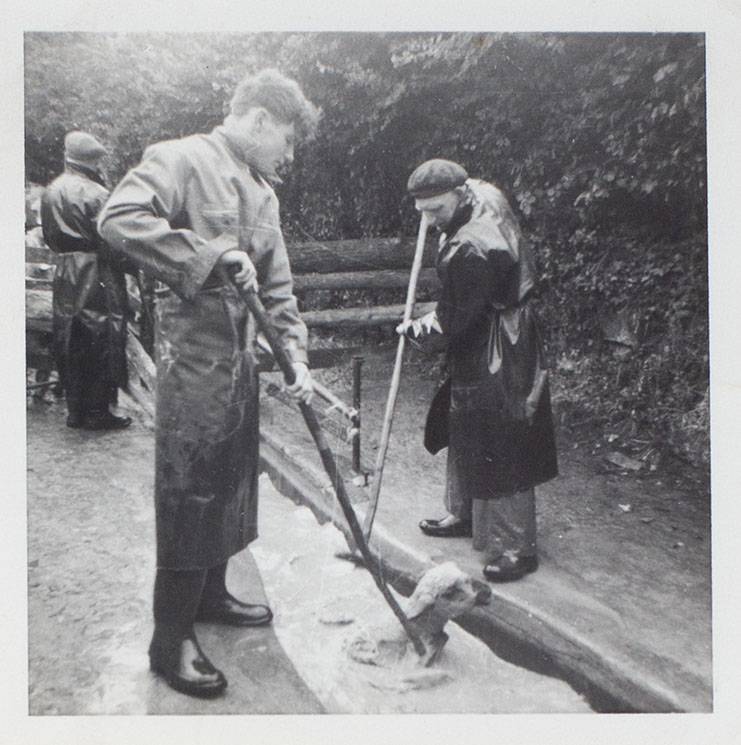
Ken Dawe as a young man, sheep dipping with his Uncle Ernest Dawe
Yvonne: One of the Dawes married into the Gourds?[2]
Ken Dawe: Yes, two of them did. Lilian married Uncle Perce and Aunty Doris married Bill (William) who was the eldest but he died quite …. He was in his sixties, I think. He had heart trouble. He went up to London for a major operation because things were a bit primitive in those days, I guess. They said he would be alright for ten years and he did just about make ten years, but they’ve all had heart problems and strokes as have I basically. Not severe, obviously, because I’m ok now.
Yes, so they moved up and then my Dad and Mum was second one up from the bottom. When Grandfather’s brother couldn’t cope with his little farm, Grandfather said “Look Charlie, you’ll have to come up here”. He said, “I’ll put you up a bungalow”, which is just over the way. He must have been an older brother I guess, because he said “You can muck about on the farm a bit, if you want, sort of retire. Well, he was a bachelor, never married. Up comes with him a lady cousin of his who lost her husband in the war. I think it was in the bombing in Plymouth because they came from the Plymouth area. So she looked after him for many, many years until she died and there was no one to look after Uncle Charlie so my Mum and Dad drew the short straw and had to go up to there, when I was two, to look after him and that’s where I spent all my childhood really.
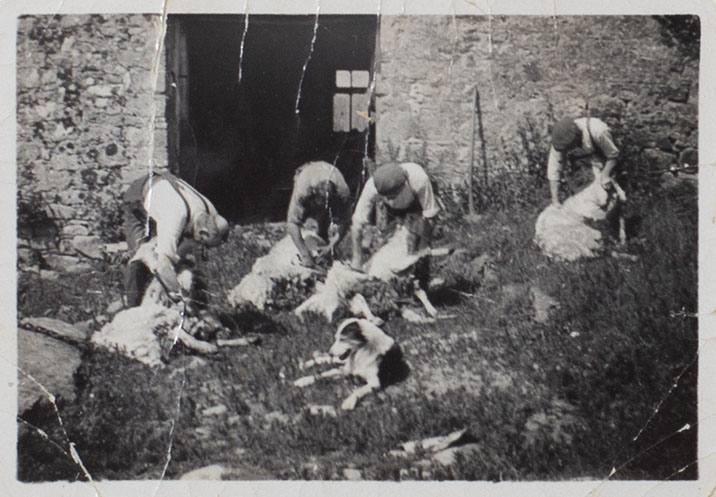
Sheep shearing at Ashill Farm
Of course, Uncle Charlie died at some point. Can’t remember when – early fifties I think and then when I got married first time around, Uncle Perce who was in your house – in the farmhouse – retired. He went up the top end of Teignmouth to live so they put me and my first wife into there and I brought that place gradually back from the grave. In fact, somewhere, I haven’t come across it yet, I’ve got a certificate from the archaeological people up in Exeter for the restoration and recording of what was then called Ashill Farmhouse
Yvonne: I’ve got a picture of it in the sixties. I told you that didn’t I?
Ken Dawe: I’ve got loads of pictures
Yvonne: I found some photographs when I was looking through – we’ve got these scrapbooks which seem to be partly W.I. but there’s all sorts in them and there were a couple of photographs of Ashill Farm taken in the sixties
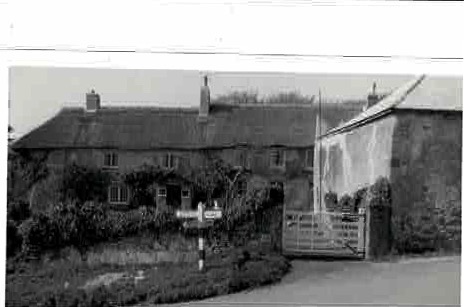
Ashill Farm 1965
Ken Dawe: Yes, we’ve come across a few, haven’t we, of different ages. Grandfather specialised in dairy and then of course his boys took it over, because he died in ’47.
Yvonne: What was your grandfather’s name?
Ken Dawe: William Henry, same as his eldest son, Uncle Bill.
Yvonne: They all did that, didn’t they? Looking through the Whidbourne family, I told you.
Ken Dawe: In fact, Uncle Bill’s son, my late cousin Douglas worked on the farm as well and until Uncle Bill died his wife – Aunty Doris who was a Gourd – she pulled out of the business, Douglas left. He worked with Gourds on the removals service to start with and then he went up to Crediton and worked for an agricultural miller’s firm producing cattle food and after he had done as much as he wanted to do there, then he came back to Shaldon and ran the Spar shop until he retired, but unfortunately he died early with cancer. There are two people you would have been most interested to talk to, had they still been alive. One is my cousin Douglas, but the other one is what we used to call Old Frank Battershall. Have you heard of the Battershalls?
Yvonne: Frank Battershall. I met his daughter the other day.
Ken Dawe: Yes. Well, Old Frank – because he had a son called Frank and they all worked on the farm, but when he retired he had nothing to do really so he used to come up and if it was a wet day and we were in the farm workshop he would talk to us about things, and I can’t remember an eighth of what he used to talk about. Somebody ought to have recorded it then and it would have been so interesting
Yvonne: See, there was a Frank Battershall in the Home Guard, because do you remember that photograph we had up in the tent with all the names on.
Ken Dawe: That would have been Old Frank
Yvonne: And I met this girl in the pub the other night. Somebody said “Oh, you ought to talk to Yvonne because she’s in the Heritage, and she started talking about growing up here and I said, “What’s your name?”. She said “Battershall”. I said “Oh, Frank Battershall”. She said, “How did you know that”. I can’t remember her Christian name
Ken Dawe: Because Young Frank, I don’t know if he was actually in the war but he trained as a paratrooper. I suppose it would have been National Service perhaps. Then he worked with the Forestry and then he came to work for us here. He was our head tractor driver, in charge of that side of it
Yvonne: I suppose when you were little, the farm machinery was just coming into its own, wasn’t it?
Ken Dawe: Oh, yes. When do you want to talk about?
Yvonne: Well, tell me what you’ve got written down there
Ken Dawe: It’s all a bit disjointed because I was watching TV last night and writing stuff down as I go along. There were some old farm hands that I knew when I was about this high. There was old Frank Battershall, who we were just talking about, there was a bloke called Ned Callard
Yvonne: Oh, Ned Callard, yes.
Ken Dawe: Frank Newton?
Yvonne: I’ve heard of Frank Newton
The video discussed in this part of the interview is now being prepared for publication on this site.
